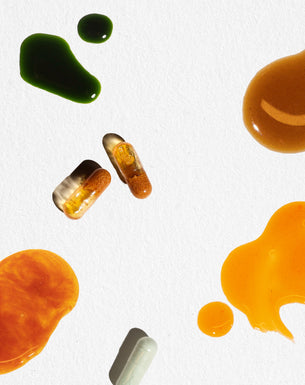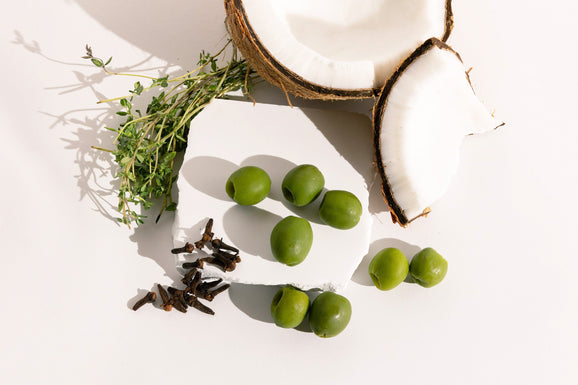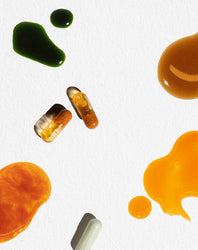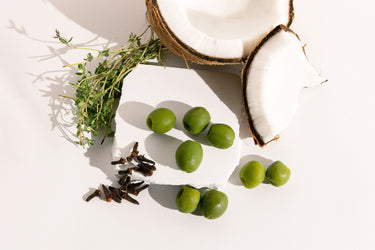
Glutathione is the master antioxidant that the human body produces naturally and uses in an array of important functions and processes.1 What are some of the benefits of glutathione? It’s a primary component in cellular health and mitochondrial management and instrumental in supporting your organs and their functions. And if you have healthy glutathione levels, your immune system can operate really well.
Aside from its production in the liver, glutathione is also found in various dietary anti-aging supplements and plant food sources, including avocados, papaya, and brown rice.
To bolster your diet with antioxidant-rich nutrition, we’ve compiled a list of six food types you can incorporate into your daily routine. Grab your favorite chopping board and let’s dive in.
Foods With High Glutathione Contents
Glutathione is an essential nutrient with an active hand in some of the human body’s most important physiological processes.
A powerful antioxidant, it helps prevent illness and disease by cleansing blood cells of harmful free radicals and repairing associated damage known as oxidative stress. It’s also a vital component of several important liver functions and plays a large role in managing mitochondrial function and maintaining DNA.2
The human body produces glutathione naturally, but it’s also present in a wide range of plant dietary sources.3 In fact, the foods with the largest amount of glutathione are vegetables.
Vegetables in the brassica family produce the most glutathione, but the molecule is present in large amounts in several other vegetables. Together, they comprise the 11 foods with the highest glutathione content. These vegetables include:
- Avocados
- Asparagus
- Bok choy
- Brussels sprouts
- Cabbage
- Cauliflower
- Cucumber
- Green beans
- Kale
- Okra
- Spinach
Unfortunately, consuming foods with glutathione is not necessarily the best way to increase your own levels. The human body simply isn’t very good at absorbing glutathione molecules from dietary sources. Essentially, this means that a good deal of the glutathione you ingest is actually expelled from the body before it can be used.
But that doesn’t mean there aren’t benefits associated with consuming these foods. Although they may not boost glutathione, studies suggest that they may still effectively reduce oxidative stress.2
Because the body doesn’t absorb glutathione from food at an efficient rate, it needs a little assistance. Fortunately, there are several easy ways to increase your glutathione intake and maximize the rate at which it moves through your body.
Below are six foods that may be able to boost glutathione levels.
#1 Sulfur-Rich Foods
If you’ve decided to boost glutathione levels by adding foods like bok choy and brussel sprouts to your diet, you should consider rotating in a few other menu items as well. Certain foods can help your body absorb and process glutathione more efficiently, so combining them may increase your chances of achieving results.
Sulfur is a natural mineral that’s present in some plants and animals. Without it, the human body would be unable to synthesize glutathione.4 As such, it may be worth augmenting your glutathione intake with sulfur-rich foods.
Many of the vegetables that are rich in glutathione are also rich in sulfur, like kale, cauliflower, and brussel sprouts. However, there are also several other plant sources that are abundant in sulfur that can supplement your glutathione intake. In addition to broccoli, watercress, and mustard greens, consider including:
- Allium vegetables – Garlic, leeks, onions, scallions, and shallots
- Cruciferous vegetables – Arugula, broccoli, cabbage, cauliflower, kale, and radishes
- Legumes – Chickpeas, faba beans, kidney beans, lentils, and peas
- Nuts and seeds – almonds, brazil nuts, walnuts, sesame seeds, and sunflower seeds
#2 Foods Rich in Vitamin C
Combining glutathione with vitamin C may help boost glutathione levels. This is mostly thanks to vitamin C’s status as an important source of antioxidants. Because it also wards off free radicals, it may take some of the pressure off of glutathione to do the job, thus freeing it up to perform its miracles elsewhere.
Certain studies suggest that vitamin C may also convert oxidized glutathione back to a useful form.5
To boost glutathione by way of boosting your vitamin C, seek out fruits and vegetables like:
- Bell pepper
- Citrus fruits
- Kiwis
- Papayas
- Strawberries
#3 Selenium-Rich Foods
Consuming adequate amounts of selenium, an essential mineral, is vital for your health and wellness. It’s an important component of several bodily functions and processes, including the activity of glutathione, and as other enzymes.
Beyond the role that selenium plays in helping glutathione work, there’s evidence that suggests it may also help maintain and even increase glutathione levels.6
This is good news for anyone looking to improve their glutathione intake. Selenium is widely available and easy to come by. The next time you’re at the grocery store, add the following selenium-rich foods to your cart:7
- Brown rice
- Brazil nuts
- Sunflower seeds
- Mushrooms
- Oatmeal
- Spinach
- Bananas
- Cashews
- Lentils
#4 Milk Thistle
If you’re consuming more foods with glutathione, you may consider adding the herbal supplement milk thistle to your diet. Studies have shown that milk thistle extract can positively impact glutathione levels in the body.
The active ingredient in milk thistle extract is Silybum marianum, which is actually the collective name for three distinct compounds. Together, they imbue milk thistle with strong antioxidant properties, which may help prevent cell damage and protect glutathione supply.8
In other studies, milk thistle has been linked to:9
- Elevated glutathione levels
- Reduced levels of glutathione depletion
#5 Turmeric
There’s strong evidence that suggests a link between turmeric, a popular spice that’s used in a variety of world cuisines, and improved glutathione levels.
The active ingredient in turmeric is the chemical curcumin. Curcumin is responsible for giving turmeric its bright yellow hue as well as its well-known health benefits, which include:
- Antioxidant properties
- Anti-inflammatory properties
Studies suggest that curcumin and turmeric may play a role in boosting glutathione levels in the human body.10 They may also be able to replenish glutathione molecules in cases of deficiency and aid in glutathione activity.
Additional Ways to Boost Glutathione
Making healthy changes to your diet, like consuming sulfur-rich foods, foods high in vitamin C, or supplementing with whey protein or milk thistle, may be effective ways to boost glutathione levels and improve your health. But often, making a few lifestyle changes in addition to your dietary ones can go a long way.
Consuming foods with glutathione and foods that help your body produce and process it are important steps toward maintaining adequate levels. But your glutathione levels can be affected by more than just the foods you eat.
Anyone interested in improving glutathione levels should also consider:
What’s nice about these foods is that they are easy to digest. So, if you’ve a point in your life when you lament, “Why does my stomach get bloated after I eat?” One way to remedy this digestive problem is to eat foods like these.
Boost Your Diet With Cymbiotika
To improve your glutathione levels, it’s recommended to eat plenty of glutathione-rich vegetables, like avocado, asparagus, and cauliflower.
If you’re looking to get your daily dose of glutathione without a visit to the grocery store, you can turn to glutathione supplements to fill nutritional gaps in your diet. Most glutathione supplements contain supporting ingredients, such as organic citrus extract, to bolster its consumption.
More specifically, at Cymbiotika we craft a Liposomal Glutathione supplement that prioritizes efficient digestion and nutrient absorption. You can pair it with our Liposomal Vitamin C supplement or take it alone. It’s packed with a variety of beneficial ingredients, including:
- CoQ10
- PQQ
- Riboflavin
- Alpha lipoic acid
When taken, the supplement can help combat premature aging, enhance energy metabolism, promote gut health, and neutralize free radicals.
Every day, our premium nutritional supplements help people everywhere improve their well-being by doing what their diets can’t. If you’re looking for a safe and healthy way to look after your glutathione levels, consider Cymbiotika. Tested, safe, and transparent, our products are the worry-free way to improve your health from the roots up.
At Cymbiotika, we believe in a healthier you. Isn’t it time you did, too? Shop our supplement collection today.
Sources:
- Journal of Nutrition. Glutathione metabolism and its implications for health. https://pubmed.ncbi.nlm.nih.gov/14988435/
- PubMed Central. Glutathione! https://www.ncbi.nlm.nih.gov/pmc/articles/PMC4684116/
- Hone Health. Eat These 7 Glutathione-Rich Foods if You Hate Getting Sick. https://honehealth.com/edge/health/best-glutathione-foods/
- PubMed Central. The effects of sulfur amino acid intake on immune function in humans. https://pubmed.ncbi.nlm.nih.gov/16702336/
- PubMed Central. Vitamin C augments lymphocyte glutathione in subjects with ascorbate deficiency. https://pubmed.ncbi.nlm.nih.gov/12499341/
- PubMed Central. Effect of Selenium Supplementation on Glutathione Peroxidase Enzyme Activity in Patients With Chronic Kidney Disease: A Randomized Clinical Trial. https://www.ncbi.nlm.nih.gov/pmc/articles/PMC4090673/
- Healthline. 20 Foods Rich in Selenium. https://www.healthline.com/health/selenium-foods
- PubMed Central. Milk thistle in liver diseases: past, present, future. https://pubmed.ncbi.nlm.nih.gov/20564545/
- PubMed Central. Effect of silymarin on kidneys of rats suffering from alloxan-induced diabetes mellitus. https://pubmed.ncbi.nlm.nih.gov/20579862/
- PubMed Central. Curcumin, a natural plant phenolic food additive, inhibits cell proliferation and induces cell cycle changes in colon adenocarcinoma cell lines by a prostaglandin-independent pathway. https://pubmed.ncbi.nlm.nih.gov/9422331/
- PubMed Central. The alcoholic lung: epidemiology, pathophysiology, and potential therapies. https://pubmed.ncbi.nlm.nih.gov/17220370/
- PubMed Central. Effects of exercise training on the glutathione antioxidant system. https://pubmed.ncbi.nlm.nih.gov/17925621/
- PubMed Central. Oxidative stress in patients with primary insomnia. https://pubmed.ncbi.nlm.nih.gov/22401887/














